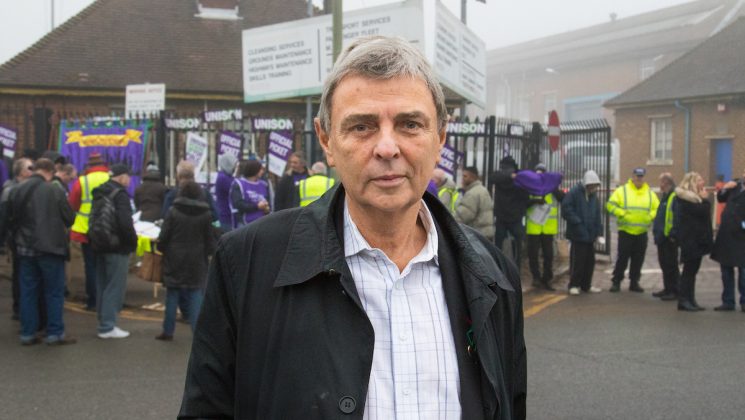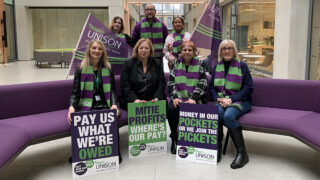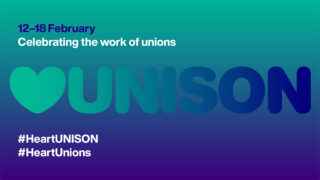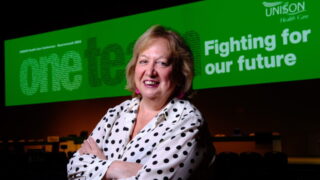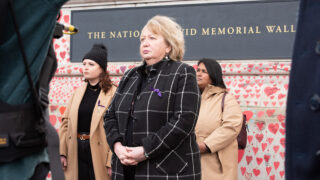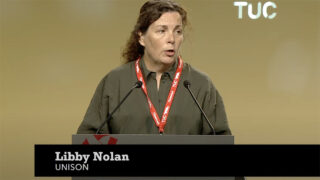‘My normal way of working – just talking to people, being there for them – can no longer happen’. All photos were taken before social distancing
UNISON general secretary Dave Prentis is very clear when he states the union’s role during the COVID-19 pandemic. “Our contribution to overcoming the crisis is to protect the people who are protecting us. We’re there for them.”
And by those people, Mr Prentis is referring to the millions of public service workers who are working tirelessly and courageously – day and night – to save lives.
“I’m simply in awe of the bravery and caring ethos our members are showing during this crisis,” he says. “It’s not just in hospitals, it’s in care, it’s in schools, it’s social workers, it’s police support staff, it’s public service workers across the whole of the frontline.
“It’s an honour for us to be able to support them, speak up on their behalf and protect them while they do their job.”
Adapting fast
Mr Prentis was talking after three weeks of lockdown in the UK, during which time nearly 8,000 people have died of the virus, some of whom have been NHS workers themselves, who have succumbed while caring for others.
But the number would be far greater, were it not for their efforts.
During this time, the union – like the nation – has had to adapt fast, to protect its own staff at the same time as looking out for its members. And while having to work at home himself, Mr Prentis remains at the heart of those efforts.
“It’s only been three weeks since we lost our offices,” he reflects. “And so much has happened in that time, to relocate people, get everyone set up at home and rebuild the way the union supports our members.
“The most important thing has been to maintain contact with them. We lost UNISON Direct [the union’s call centre], but re-established email connection with members within seven hours. We’ve had to re-establish a central office working from home. All of our regions are having to work from home. We’ve got people working from early morning all the way through the night to provide that support to our members at the frontline.
“We’re a complex organisation and the way we’ve responded has been incredible, the activists and the officers alike. And we know it’s not business as usual. We’re doing the best that we can, because our members deserve it.”

Being away from the members is something that the hands-on general secretary finds difficult on a personal level.
“My normal way of working – just talking to people, being there for them – can no longer happen,” he laments. “Part of my work is to actually go and visit branches and find out what they’re experiencing, what their issues are, what we can do to help them.
“And that’s what our union’s about – people coming together, meeting together, being part of a collective. None of us can do that now, everything is done remotely, on the phone, in a video meeting. That personal contact where you could just chat over a cup of tea or coffee, has gone. That’s really difficult for us.
“But the crisis we’re going through is unprecedented. We’ve never experienced anything like this. I always say to people that trade unions were not created for the good times, they were created for the bad times, and it’s how you respond in those difficult times that makes you into a great union.”
Since the crisis began, UNISON has been working in all directions – on the one hand keeping lines open with members and advising and supporting them minute-by-minute, on the other using its political influence with the government and government agencies, to protect their safety and workplace rights.

Right at the top of the list of the union’s priorities is personal protective equipment – the now familiar PPE.
Mr Prentis reports that he and his senior colleagues, the service group national secretaries and assistant general secretaries, are in direct contact with government, across departments. What’s more, the government is actively coming to the union.
“Within two minutes of me sending out public letters seeking a meeting – a virtual meeting – with the prime minister, the secretary of state for health, Matt Hancock, came back to me,” he says. “And I made it clear what our demands were. We’re saying what needs to be done and we’re expecting the government to respond.
“Testing is a big issue, but we’re concentrating as a union on personal protection in the workplace and making sure that managers at local level do risk assessments on all workers, so that they’re not walking into unsafe workplaces.
“Advice went out from the government last week saying that everybody should be assessed on the equipment that they need. We’re now working to make sure that there are no problems in delivery.”
Unfortunately, there do remain “major issues” still in the NHS about the delivering of PPE and the replenishment of stocks.
“You then go into the care side and it’s far worse. In care there are over 5,000 establishments, and there’s no central coordinating group, so you’ve got to get into the care homes themselves and make sure that people are protected.”
So while progress has been made, the union has no intention of taking the pressure off, he insists.
“PPE will be an ongoing issue throughout the crisis, because even if initial stocks are getting through, they’ve got to be replenished. An enormous amount of the PPE has to be thrown away, it can’t be reused. As the crisis deepens, we have to ensure it’s getting replenished properly in the workplaces.”
Heart-breaking hotline
The government is listening, he says, not just because of UNISON’s size and influence, but because the country’s public service union has the greatest resource of information in these critical times – the frontline workers themselves.
Much of that information, including 3,500 emails in six days to UNISON’s PPE alert webpage, has been harrowing.
“When you read the emails coming into us from our members, you see the extent of the problem,” says Mr Prentis. “You also see the personal stories, of what people are going through to protect us.
“They’re going into work afraid, because they haven’t got the equipment. They’re travelling on public transport, then they are having to go back to their families, and they are worried sick as they’re doing it. People are being made ill, people are dying because they haven’t got the PPE in place.
“It’s these personal stories, the personal tragedies of people trying to protect us, that really motivate you as a union to be there for them.”
UNISON’s bargaining advice for the crisis, which was sent to all activists in the union, has now been adopted by Public Service International – which means 200 public service unions in the world are using it to deal with employers at a local level.
And at home, members old and new are clearly responding to the union’s efforts. The COVID-19 web page containing a full range of information and advice, and which is updated three times a day, is gaining millions of hits.
“People are coming to the union,” says Mr Prentis. “Recruitment has never been higher, even though we’re not seeking to recruit, because people are worried, they’re scared. And they are the frontline.”
One rare piece of good news in the last few weeks has been the election of Keir Starmer as the new leader of the Labour Party, with Angela Rayner as his deputy.

Mr Prentis considers the result in its current context. “Why we are so pleased Keir’s been elected, in this moment in time, is that he’s given a very clear offer to government that he will work with them. And that’s what we think we need. We don’t need people scoring silly political points, we need all the talents coming together, to be pooled to tackle this dreadful crisis. He gave that offer immediately.
“He also rang me on the day that he won the ballot, the day he became leader, to find out what support he could provide UNISON as we deal with our members’ issues, what he needed to raise with government. We’ve given him everything that we’re putting out on personal protection, so that he too can raise it as we’re raising it.”
Day of reckoning
In its own dealings with government, UNISON too is prioritising the urgent work at hand.
That said, Mr Prentis is quite clear: “There will be a day of reckoning.”
He says: “We’re highly critical of the lack of planning, especially in January and February, to make sure that our people, people who are protecting us, have the equipment that they need to protect themselves. I think the government knows that, as well. There will be many, many questions that they will not be able to answer.
“But now is not the time. We’re going through the worst crisis in living memory, and it’s up to us to get our society through that crisis. As far as we’re concerned, as a public service union, the issues that are becoming apparent now will be dealt with at the right time.”
For now, he adds, “I’m so proud of everything that our people are doing. The country is expecting so much from them, they are delivering so much, that their union has got to be shoulder to shoulder with them.
“That’s what motivates us. Everybody involved has got that message – it’s singular, it’s focussed, we know what we’ve got to do to get our people through this crisis.”

